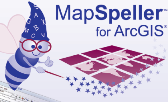|
|
In conventional spell-checkers, words are validated against one or several lists of correctly
spelled words called dictionaries. If a word is in a dictionary,
it is deemed correctly spelled. Otherwise, it is not. If the latter case,
conventional spell-checkers typically offer users a number of closely matching but
correctly spelled words.
The spell-checking of maps is similar, yet more challenging for
several reasons:
-
Text in maps resides in many different
types of objects. Some of those objects are dynamically updated
based on varying conditions.
-
Text is laid down irregularly in maps and is represented in different
fonts and at different angles, making it hard to proof manually.
-
GIS Maps, through their underlying databases, can contain
enormous amounts of text.
-
Many words on maps and in feature classes are geographic nouns. Conventional dictionaries,
such as those used in word processors, may contain the spelling of some major geographic
features such as countries and state capitals but are unlikely to
contain local geographic names, and for a good reason. Many of those
spellings are only valid at certain geographic locations.
-
Maps can contain abbreviations or codes such as zoning codes on a
parcel layer. Those abbreviations or codes are typically not in
alphabetical dictionaries and placing them in custom dictionaries may
reduce the spell-checking accuracy of other maps for which those
codes or abbreviations are not correct.
-
Some words are unlikely to be found in maps. Even though they exist and
are correctly spelled, they are likely
misspellings for other words. For example, sight for site,
pubic for public, bed for bad, or stuff for staff.
MapSpeller solves those challenges by spell checking both
conventionally and
spatially, and by
offering key innovations. |

